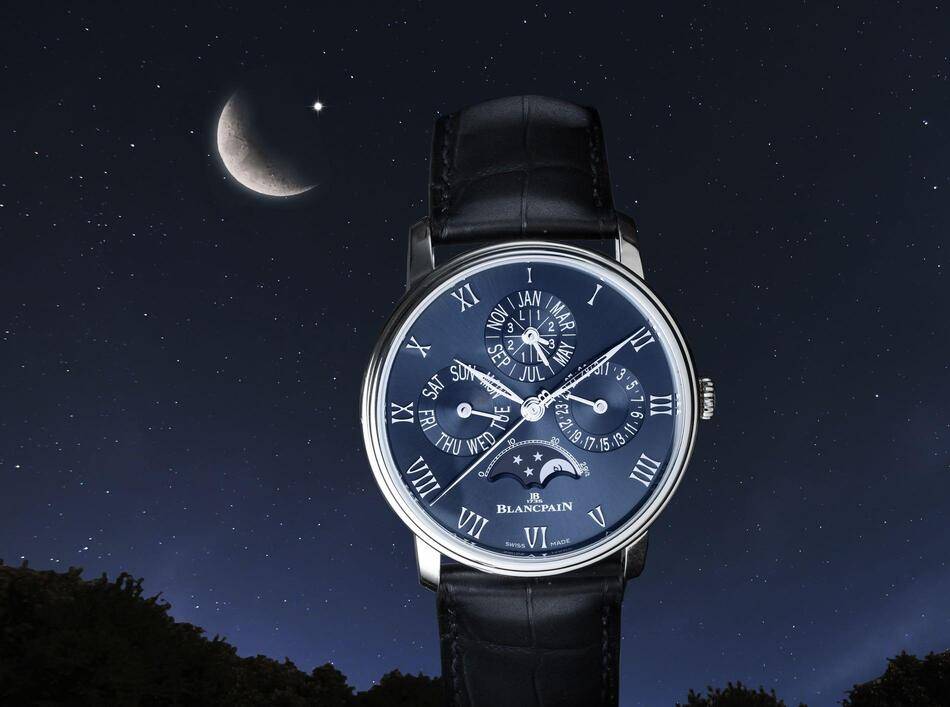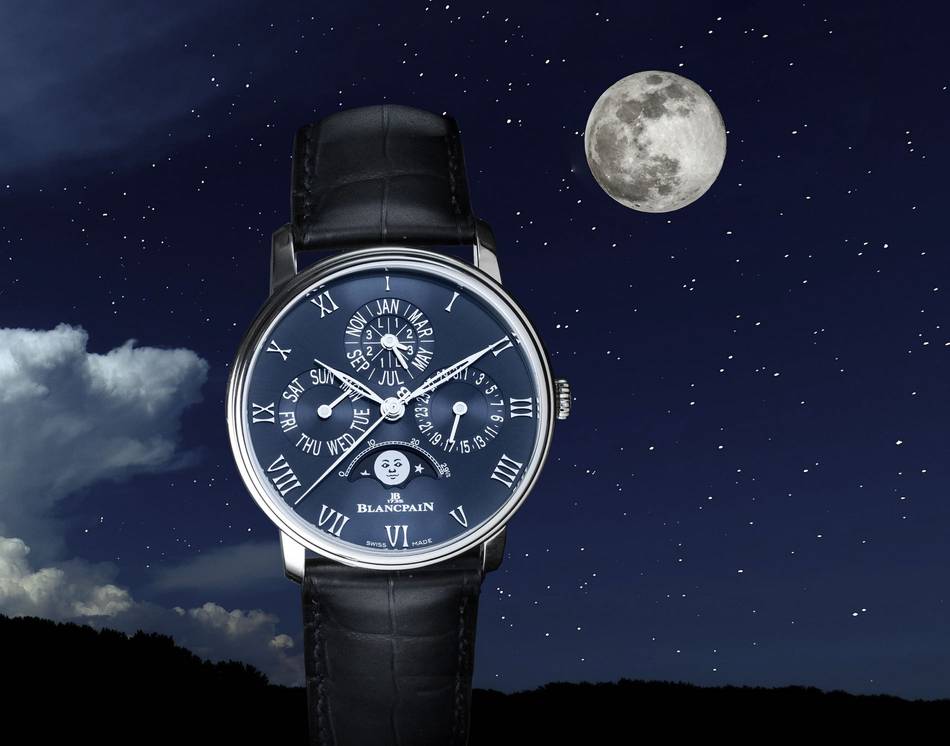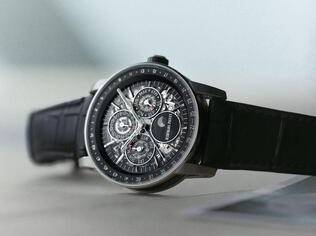By Kien Lee
Founded in 1735, Blancpain has never ceased to create exceptional timepieces with exemplifying technical and aesthetic characteristics.
This year, for its boutiques only, the Swiss manufacture has unveiled an exclusive limited edition of its renowned Villeret Quantième Perpétuel model. This magnificent platinum watch with a blue dial is available in 88 pieces only, along with horological complications, specifically the moon phase and perpetual calendar.
Executed with accuracy, the latter serves to indicate the day of the week, date, month and leap year without requiring any adjustment until 2100. Endowed with a veritable mechanical memory, perpetual calendar models are some of the most exceptional timepieces that Blancpain produces entirely in-house.
Oft described as the "least practical yet most romantic" of complications, the moon phase seen in modern offerings by haute horlogerie brands however, has a deep inextricable link with Blancpain, and is a story worth a telling.
 3 June 2019 marks the beginning of a new moon, as seen by the starry sky in the moon phase window
3 June 2019 marks the beginning of a new moon, as seen by the starry sky in the moon phase window
A Modern History of Moon Phase Display
The oldest mechanized device depicting moon phases is thought to have been built by Archimedes, earlier than 200 B.C. but it was not until 1221 A.D. that the astrolabe of Muhammad ibn Abi Bakr al-Ibari of Isfahan was able to indicate the moon’s phase and age, as well as the relative positions of the sun and the moon. This approach was to set the basis and foundation for centuries, in clock design and more.
The moon phase indication started appearing in clocks, then pocket watches, eventually unto wristwatches. However, the pivotal milestone was the invention of the balance wheel in 1675 by Dutch mathematician Huygens, which ensured accurate timekeeping through regulating the unwinding of the spring that powered it. It was then that the moon phase complication could both be measured and mechanically depicted, accurately.

Blancpain and the Moon Phase Complication
In the 1970s, the onslaught of quartz watches, powered by battery, threw Swiss watchmaking into turmoil. Inexpensive yet highly accurate timepieces, driven by electrical circuitry rather than mechanical gears, springs and such, cannibalised the Swiss watch business. Faced with a low cost (potentially) "category killer," many Swiss companies reacted by reducing the complexities of what they offered, and stripping their timepieces of complications was a start.
But not Blancpain.
Rather than recede with the losing tide, Blancpain had a boldly different idea in the 1980s. It would buck the trend by going upscale, demonstrating that its creations were in fact rare pieces of mechanical art, executed with beautiful craftsmanship, a result of centuries of watchmaking know-how.
It was in 1983 that Blancpain introduced its first moon phase watch, leveraging on its own rich history of making clocks, pocket watches and earlier wristwatches. This move not only propelled the Blancpain to prominence, but it also showed other watch houses what they needed to do to combat quartz. Indeed, others have followed.
Since then, the moon phase would have an undisputed and irrevocable connection to Blancpain, and the manufacture’s devotion to the complication as a symbol of its blossoming whilst others failed, would lead it to feature the moon phase in more in more varieties of timepieces and designs than any other watch house.
 10 June 2019 marks the first quarter of the moon
10 June 2019 marks the first quarter of the moon
The Blancpain Villeret Collection
Villeret, the village of Blancpain's birth, provided the name for the manufacture's most classical collection. Its design offerings embody the house's initial aesthetic choices to date, whilst expressing timeless elegance.
An Ode to Complications
On the outside, the Villeret boasts sleek lines, clarity of dials and finesse of its double-stepped cases. On the inside, it has drawn from Blancpain's research and innovation in movement production. Correctors beneath the horns, protected calendar and moon-phase mechanisms, prodigious power reserves, are just some of the key features within the modern Villeret timepieces.
 17 June 2019 makes the full moon
17 June 2019 makes the full moon
Villeret Quantiēme Perpétuel - Boutique-Exclusive Blue Dial Edition
In continuing to celebrate classicism and showcase its traditional watchmaking prowess, Blancpain now offers its iconic Villeret Quantième Perpétuel in a blue dial.
The signature dial layout of Blancpain calendar watches is ever present, with indications at 3, 9 and 12 o'clock, along with a moon phase at 6 o’clock as well as a large central seconds hand complementing those showing the hours and minutes.
Inside, the watch is driven by the self-winding 5954 movement, which has a security system implemented by Blancpain for calendar timepieces to protect against improper handling and adjustment by the user.
Blancpain has also provided smooth and easy adjustment of the indications, with under-lug correctors - the calendar hands and the moon phase can be adjusted simply by using a finger to press the small "levers" located on the back of the case. Aesthetically, this patented invention leaves the case middle free of the lateral correctors normally found on calendar watches.
Featuring its iconic double-stepped bezel, this Villeret model encased in platinum measures 40 mm in diameter and is water-resistant to 30 m. An anti-reflective sapphire crystal protects, and allows a clear view of the deep blue dial accentuated by slender white gold hour-markers.
Issued in an 88-piece limited edition and available exclusively at Blancpain boutiques worldwide, this timepiece is fitted with a blue alligator leather strap secured by a folding clasp.
 25 June 2019 marks the third/last quarter of the moon
25 June 2019 marks the third/last quarter of the moon
With all that has been said, it would not be an understatement to state that the modern renaissance of Blancpain is encapsulated in this new magnificent Villeret Quantiēme Perpétuel timepiece.




















